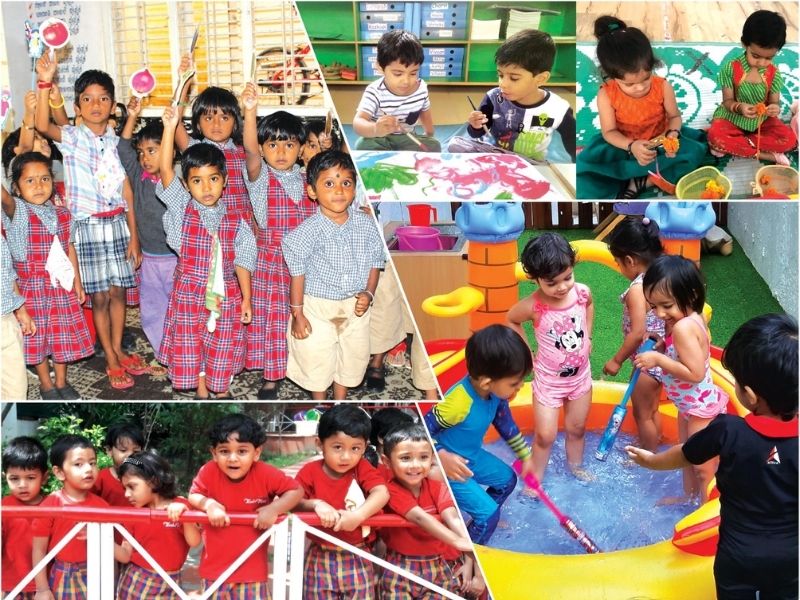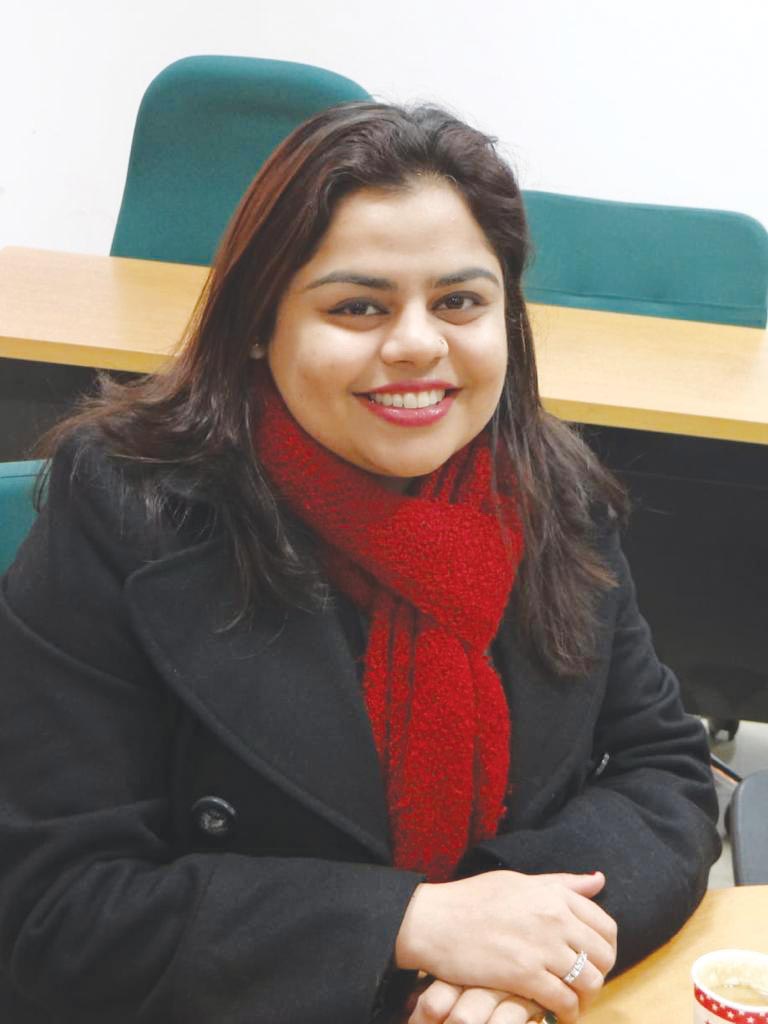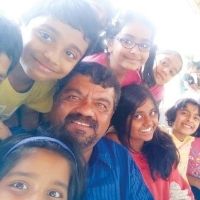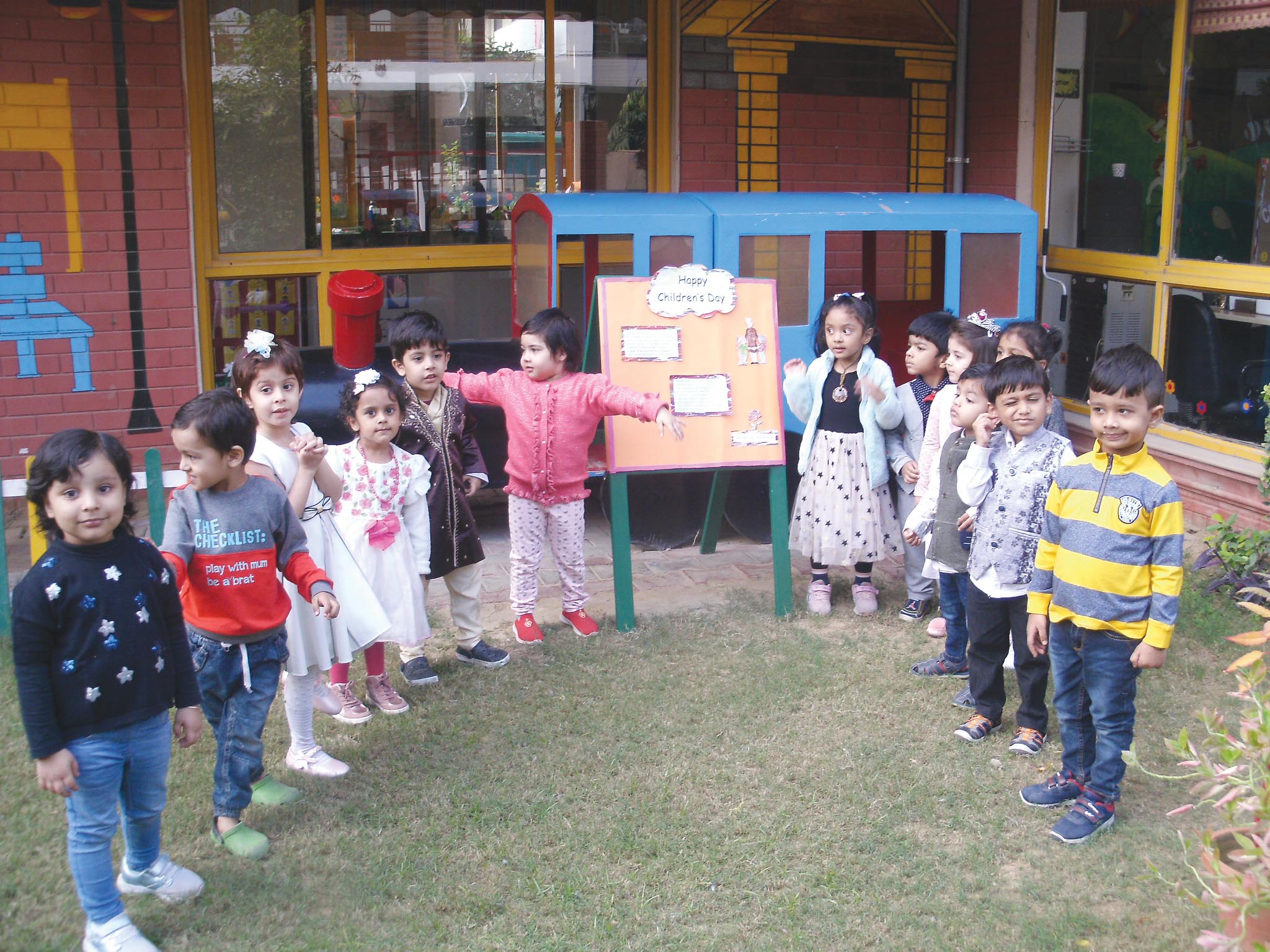When the cost of the pandemic damage inflicted upon the country’s education sector is assessed after the polity limps back to normalcy, it’s certain to be very heavy. Especially in the nascent early childhood care and education sector – Dilip Thakore

Pre-primary school children: massive learning loss prospect
According to most indicators, the worst of the Coronavirus pandemic surge which prompted the Central government to promulgate the comprehensive national lockdown of industry and business from March 25 last year, has subsided. Factories and large and small industrial units are humming again and production volumes are almost back to pre-Covid levels, with business and trade having substantially resumed.
Roads in the country’s ill-planned cities are jammed and public transport is packed as usual, even as the Sensex, the bellwether of the National Stock Exchange, has hit an all-time high of 50,000. With doctors and nurses in hospitals and primary health centres across the country administering anti-Covid vaccine jabs, the dormant energy of citizens seems to have been aroused. Despite the Reserve Bank’s prediction that national GDP will contract by 7.7 percent in the fiscal year ending March 31, 2021, the economy is heading towards a V-shaped recovery with the recently released Economic Survey 2020-21 forecasting double digit economic growth in fiscal 2021-22.
However in the euphoria of the bounce back from the deadliest pandemic to have swept the subcontinent in the past century, it is pertinent to note that the vast majority of the country’s 1.60 million primary-secondary schools, 41,901 junior and undergrad colleges and 1,028 universities with an aggregate enrolment of 300 million children and youth are still shuttered. Only a few schools and higher education institutions have reopened their campuses for senior students to attend classes, libraries and laboratories at their option and with express parental consent. When the cost of the structural damage inflicted upon the country’s already struggling education sector by this lethal virus is assessed after the battered polity limps back to normalcy, it is certain to be very heavy. According to a Unesco report (December 7, 2020), 320 million children worldwide were out of school on December 1, an increase of nearly 90 million from 232 million a month earlier.
It’s safe to presume that the majority of shuttered classrooms are in developing countries of the third world. In India while the country’s top 2,500-3,000 private schools ranked in the annual EducationWorld India School Rankings have smoothly transitioned to online teaching-learning, in 1.2 million government schools with an aggregate enrolment of 132 million children, desultory education is being provided through non-interactive television and cell phones. Citing a World Bank report, Vikas Dhoot, correspondent of the reputed Chennai-based daily The Hindu (October 11), warns that “the extended closure of schools amid the Covid-19 pandemic could dent India’s future earnings by anywhere between $420-600 billion (Rs.30-44 lakh crore), as depleted learning levels of students will translate into poorer productivity going forward”.
Earlier, a study (May 2020) conducted by the US-based Brookings Institution — the world’s largest and most respected think tank — on the probable effects of mass schools closure in the US until fall (October 2020) indicated that school students are likely to lose 30 percent of the learning gains in reading acquired in the previous year. “In mathematics, students may show even smaller learning gains from the previous year, returning with less than 50 percent of gains. In lower grades, students may be nearly a full year behind in math compared to what we would observe in normal conditions,” says the study report (https://www.brookings.edu/blog/brown-center-chalkboard/2020/05/27/the-impact-of-covid-19-on-student-achievement-and-what-it-may-mean-for-educators/).
In India, where per-child expenditure in public/government schools in particular, is a fraction of what’s spent in the US, and assorted ills such as multi-grade teaching, chronic teacher absenteeism and rock-bottom learning outcomes (repeatedly highlighted by the Annual Status of Education Report (ASER) of the Pratham Education Foundation) are normative, children’s loss of learning because of the ill-advised sustained lockdown of schools for fear of pandemic contagion, is certain to be several magnitudes greater.
Unsurprisingly, the damage inflicted upon the Indian education system by the Covid-19 pandemic has not been credibly assessed, especially for the nascent preschool education sector. “More specific to early childhood education, this international health crisis has precipitated unprecedented, sweeping, and dramatic changes in the lives of children and their families, pre-service and in-service teachers of young children, and early childhood teacher educators. Worldwide, Covid-19 has also pushed the early childhood education system to the verge of collapse and mobilised leading early childhood organisations to advocate for Covid-19 financial packages to protect early education programmes,” says a PMC report of the US National Library of Medicine — National Institutes of Health (July 13, 2020).
Back home in India the education sector hasn’t blipped on the radars of the Central and state governments. The prime minister’s illusory Rs.20 lakh crore pandemic relief package announced last May contained no relief for the country’s 450,000 private schools (or private higher education institutions) which host 47.5 percent (119 million) of all school-going children.
Moreover, 400,000 budget private schools (BPS) with an aggregate enrolment estimated at 60 million and 55,000 private pre-primaries/preschools have been callously excluded from the category of MSMEs (micro, small and medium enterprises) which have been provided some pandemic relief by way of soft credit, loan moratoriums and long-term loans. On the contrary, not only are private preschools being denied relief loans by public sector banks, several myopic state governments have encouraged parents to stop paying fees while proscribing online interaction between pre-primary teachers and pupils.
As a result according to some media reports, almost half the country’s estimated 55,000 private preschools have shut down operations and another 25 percent are struggling to survive. According to a survey conducted in October 2020 by the Mumbai-based Early Childhood Association (ECA, estb.2011) which has a membership of 48,000 mainly private preschools and teachers across the country, 2,000 ECA member and over 5,000 non-member pre-primaries countrywide have thrown in the towel and wound up their enterprises.

Popat Vats: women hit hardest
“Media reports stating that a large number of pre-primaries are up for sale are fairly accurate and not alarmist at all. They are a wake-up call for the Central government, which has accorded ECCE (early childhood care and education) high importance in the National Education Policy 2020, to provide a pandemic relief package for private preschools. Although some public sector banks are advancing loans to preschool promoters, the paperwork and long-drawn out processes are a great disincentive. The Central and state governments should bear in mind that the great majority of private preschools are promoted by women, and most teachers are women. Therefore, women including working mothers have been hit very hard by the prolonged closure of preschools for over nine months. With many of them in danger of losing their savings and years of effort in establishing and modernising their schools, government should direct public sector banks to provide long-term loans to private preschool proprietors to tide them over the pandemic, save teachers’ jobs and fulfill the objectives of NEP 2020. With education being a concurrent list subject under the Constitution, the task of saving the country’s private preschools is being passed back and forth between the Centre and the states and there is a clear danger of all the recent gains of professionalising ECCE being lost,” warns Dr. Swati Popat Vats, president of the Podar Jumbo Kids network of 170 owned and 330 franchised preschools, and founding president of ECA.

EuroKids Rajan: brutal impact
Inevitably, the national lockdown of pre-primary education institutions has hit proprietorial standalone preschools, typically promoted by former teachers and edupreneurs attracted by freedom from government regulations that the private ECCE sector enjoys, harder than it has well-resourced professionally managed corporates that have debuted in this sector in the new millennium. These corporates such as EuroKids, Podar Jumbo Kids and Kidzee typically operate under the franchise model providing edupreneurs the right to use their well-established brand names, infrastructure management and teacher training services and well-researched and tested ECCE curriculums, in consideration of franchisees paying them quarterly or annual fees. Unsurprisingly, franchised preschools given the aid and assistance of well-resourced franchisor companies, have been able to continue the learning of their children, even if less effectively than in normal pre-pandemic times.
Prajodh Rajan, president of the Mumbai headquartered EuroKids International Pvt. Ltd (estb.2001) which has franchised 1,100 preschools in 350 cities across the country and claims to have prepared and certified over 300,000 youngest children for entry into primary education, says the impact of the protracted lockdown has been “brutal” for standalone proprietorial preschools.
“Although some organised sector ECCE providers including EuroKids swiftly migrated to remote learning engagement to provide uninterrupted learning, the demand for online learning has been low in the pre-kindergarten segment, i.e, playgroups and nursery, with average demand coming from kindergarten students. Most of the ECCE segment consists of unorganised (standalone, proprietorial) pre-primaries with limited resources to offer remote learning engagement tools. Therefore, the overall impact of the Covid pandemic on ECCE has been harsh with many ECCE centres having to shut down permanently,” says Rajan.
In this connection, it’s important to note that the heavy damage to early childhood education is not restricted to the estimated 55,000 privately promoted preschools that are in the vanguard of the nation’s belated ECCE movement. Private preschools provide professionally administered ECCE to a mere 5-10 percent of the country’s 165 million infants in the 0-5 age group. The vast majority of youngest children receive basic ECCE in the country’s 1.3 million anganwadi centres (AWCs) established under the Central government’s Integrated Child Development Services (ICDS) programme introduced in 1976.
However, the prime objective of AWCs established countrywide is to provide nutrition to lactating mothers and new borns of low-income households. The quality of early childhood education dispensed by under-paid, under-trained and usually solitary AWC workers is rudimentary. Moreover, the country’s one million-plus AWCs have room to accommodate only 80 million of India’s under-5 infants. Over half don’t receive any formal ECCE at all, a colossal waste of high-potential human capital.

Mahendru: time sensitive matter
Unfortunately, AWCs across the country have been shut down for over nine months with 80 million youngest children not only deprived of all-important ECCE, but also of free-of-charge nutrition provided by these centres. According to Dr. Vijayta Mahendru, a policy analyst at the Delhi-based Centre for Budget and Governance Accountability (CBGA), a highly-respected Delhi-based think tank (estb.2005), children in AWCs have suffered “permanent, irreversible, and irredeemable” damage during the pandemic prompted national lockdown of pre-primary schools.
Experts have noted that nutrition eclipses ECE (early childhood education) in ICDS — both in terms of funds received as well as the time and attention given to it by the AWW (anganwadi worker). This is due to several reasons like lack of adequate resources, infrastructure, personnel training and overburdening of AWWs. Despite these shortcomings, AWCs remain the largest providers of ECE in India. The Covid-19 pandemic has caused serious disruption to the entire ICDS system… ECE is a time-sensitive matter. Therefore, it is critical, not only for the future of children, but of the entire society, that this matter be addressed urgently, alternatives devised promptly and children begin to receive vital pre-school education,” wrote (September 29) Mahendru, an economics postgrad of Delhi University and JNU and former consultant with Tata Steel and Indian Council of World Affairs, prior to signing up with CBGA in 2019, in a blogpost for CBGA (https://www.cbgaindia.org/blog/losing-precious-time-impact-covid-19-early-childhood-education/).
The heavy damage suffered by the ECCE sector is especially disheartening for your editors in EducationWorld. From the early years of the new millennium, this publication has been in the forefront of a national initiative to impact the vital importance of foundational ECCE upon the public and government. Following a chance encounter in 2005 with educationist-philanthropists Lowell and Mike Milken, co-promoters of Knowledge Universe, a Los Angeles-based corporation which owned Kinder Care, the largest chain of private preschools in the US, who readily agreed to purchase an equity stake in EducationWorld, this publication has convened ten international/national ECCE conferences to discuss and debate early childhood education issues.
Moreover since 2010, we have been conducting the annual EducationWorld India Preschool Rankings which rate the Top 20 preschools in 16 cities and towns countrywide under ten parameters (including teacher competence, infrastructure, safety & hygiene, individual attention to students) and rank them in each city. Subsequently at our national conferences, promoters and principals of top-ranked preschools are felicitated and presented prizes and certificates.
ECCE leaders and professionals acknowledge the spearhead role played by this education advocacy publication in disseminating awareness of professionally administered ECCE on government, educators and parents countrywide.
“The impact of EducationWorld is huge, mammoth and massive. Over the past 20 years, if any positive changes have happened in education, it’s because EW has raised them editorially, debated them in conferences and constantly badgered the government and education stakeholders. Also on behalf of the Early Childhood Association, I’d like to thank EducationWorld for leveraging our work, at a time when we were struggling to be heard and seen,” acknowledged Dr. Swati Popat Vats in a tribute to EW on the occasion of its 20th anniversary in 2019.
The upshot of the concerted efforts spanning a decade of ECA, EducationWorld and knowledgeable education professionals was that both the T.S.R. Subramanian (2016) and Dr. K. Kasturirangan (2018) committees constituted to frame the National Education Policy of the newly-elected (2014) BJP/NDA government at the Centre, recommended formalisation and greater official attention to ECCE.
To the great satisfaction of your editors, the National Education Policy (NEP), 2020 promulgated with great fanfare on July 29 last year accepted the recommendations of the Kasturirangan Committee to transfer jurisdiction of ECCE from the Union ministry of Women and Child Development to the renamed (from HRD) Union education ministry, universalise early childhood education and integrate it with the formal primary-secondary school system.
“Universal provisioning of quality early childhood development, care and education must be achieved as soon as possible, and no later than 2030 to ensure that all students entering Grade I are schools ready,” says NEP 2020 (para 1.1) accepting this recommendation of the KR Committee in toto. The new policy mandates that the 10+2 school system which took no cognition of ECCE, should be reconfigured into a 5+3+3+4 preschool to class XII system integrating ECCE to provide children a strong foundation for deriving the full benefits of secondary and tertiary education.
But even as NCERT (National Council of Educational Research & Training) and NCTE (National Council for Teacher Education) were working on developing curriculum frameworks by early 2021, the Coronavirus which originated in Wuhan (China) last November, transformed into a virulent pandemic. On March 25, the Union government ordered the closure of all education institutions countrywide including 55,000 private preschools and 1.3 million AWCs (anganwadi centres). And given that ECCE is essentially group play-driven and youngest children cannot — and should not — be given access to digital devices for online learning, early childhood education has been especially hard hit.
“The continued shutdown of education institutions across the country has had a devastating impact on pre-primary education in Karnataka with over 1,500 preschools statewide having closed down completely and their owners experiencing great difficulty in selling their furniture and learning material. Closed pre-primaries include 50-100 schools franchised by small companies with limited capability to support franchisees during this troubled period.

Banwasi: malnutrition pandemic warning
Unfortunately, the state government has made a bad situation worse by restricting online teacher-pupil interaction to a mere 30 minutes per day and advising parents not to pay children’s fees. Private preschools apart, all AWCs have also remained shuttered for over nine months. Since AWCs are attended by children from low-income households mainly because they provide a free mid-day meal, the lockdown of AWCs has created a huge malnutrition problem in poor households and thousands of very young children have been pushed into the informal workforce,” says Pruthvi Banwasi, a child mental health graduate of Kuvempu University and certified Montessori teacher, and currently secretary of the Karnataka Council of Preschools (estb.2014), which has a membership of 2,500 private proprietorial and franchised preschools across the state.
According to Banwasi, also a trustee of the Roots chain of five owned and franchised preschools with an aggregate enrolment of 150 students, notwithstanding the high importance accorded to early childhood education in NEP 2020, the BJP-led state government has totally ignored the predicament of the state’s estimated 25,000 recognised and unrecognised preschools including 62,580 AWCs.
“The Central government has not classified preschools as MSMEs (micro, small and medium enterprises) entitled to special credit and soft loans from public sector banks. And with bank loans moratorium period decreed by the Central government having elapsed, a large number of preschool promoters who have had to continue paying EMIs and rent, have pledged their assets including gold and jewellery to fund their schools. Curiously, the state government has allowed pubs and malls to function, but not preschools and primaries. This is a grave injustice. It should immediately permit preschools to start short-duration physical attendance classes — as online learning is not suitable for youngest children — subject to parental consent. The employment of thousands of pre-primary teachers and irreparable loss of learning of youngest children is at stake,” warns Banwasi.

Private pre-primary in Gurgaon: modern ECCE providers
Although the political class of the country has a notorious record of trivialising education, committed educationists warn against taking the massive blow inflicted by the once-in-a-century Covid-19 pandemic upon the education system — and particularly the early childhood education sector — lightly. “When the city of Reggio Emilia in Italy was destroyed in World War II, its citizens resolved that before rebuilding their homes and the city, they would first rebuild early years learning centres to ensure that while they are busy with reconstruction, their youngest children would be safe, stimulated and wouldn’t lose their most important years of development. My plea is that every state and local government in India should learn from this example. Research studies conducted by Nobel laureate-economist James Heckman have conclusively proved that every dollar invested in ECCE will reduce expenditure of $16 in remedial school and higher education. The Central, state and local governments should urgently vaccinate all preschool and anganwadi teachers and restart day-cares and preschools so that parents get back to work and place the economy back on track,” advises Dr. Swati Popat Vats, president of ECA (quoted earlier).
Prajodh Rajan, president of the EuroKids chain of 1,105 owned and franchised preschools, also urges the immediate reopening of play and preschools to recover at least some learning loss of youngest children. “As acknowledged in NEP 2020, early childhood care and education plays a critical role in building a foundation for lifelong learning and well-being for every child. Now after almost the entire services sector has been opened up for resumption of business, it’s high time that ECCE centres are permitted to function at the earliest. Several scientific studies from around the world indicate low Covid infection rates among youngest children. Therefore, permitting preschools to restart subject to their following strict safety SOPs (standard operating procedures) prescribed by municipal corporations/councils is an urgent imperative in the national interest,” says Rajan.
 The comprehensive neglect of the education sector and adamantine refusal of government to classify private education institutions — including pre-primaries — as MSMEs and thus eligible for pandemic relief packages such as soft loans, longer repayment periods and government subsidies, indicates that the country’s politicians and bureaucrats are unaware of the massive relief packages provided to schools and higher education institutions in countries world over to tide them over the pandemic period.
The comprehensive neglect of the education sector and adamantine refusal of government to classify private education institutions — including pre-primaries — as MSMEs and thus eligible for pandemic relief packages such as soft loans, longer repayment periods and government subsidies, indicates that the country’s politicians and bureaucrats are unaware of the massive relief packages provided to schools and higher education institutions in countries world over to tide them over the pandemic period.
In the US under the Coronavirus Aid, Relief and Economic Securities (CARES) Act passed last March, $13.5 billion (Rs.98,550 crore) — a sum equivalent to the 2020-21 annual education budget of the Union government — has been provided for additional funding of public, charter and private schools. In addition, $8.8 billion (Rs.64,139 crore) is provided for children’s mid-day meals during the period of schools closure; $3.5 billion (Rs.25,510 crore) to subsidise childcare of low-income households; $750 million (Rs.5,625 crore) for the Head Start early years education programme and $100 million (Rs.728 crore) under Project SERV for sanitising and disinfection of schools (see box p. 43).
In sharp contrast, not only has the Union government declined to classify private education institutions, which host 47.5 percent of all school-going children and 70 percent of youth in higher education as MSMEs entitled to long-term bank credit and interest subsidies, several state governments have brazenly encouraged parents to stop paying contracted tuition fees even if their children are availing online education. As explained earlier in this report, sustained neglect compounded by shocking official irresponsibility has devastated the nascent ECCE sector which was belatedly given high importance in the National Education Policy 2020.
The plain truth is that India’s privately-promoted preschools are the only institutions that provide modern, globally benchmarked ECCE to a small minority of the country’s 165 million children in the 0-5 age group. If they are not re-opened immediately and provided special pandemic relief funding, Indian education will suffer long-term permanent damage. And if the country’s 1.3 million AWCs are not restarted, a new child malnutrition and stunting pandemic will sweep the country.
ECCE: The Heckman Equation
Economics Nobel laureate (2000) Prof. James J. Heckman’s groundbreaking work with a consortium of economists, psychologists, statisticians and neuroscientists shows that early childhood development directly influences economic, health and social outcomes for individuals and society. Adverse early environments create deficits in skills and abilities that drive down productivity and increase social costs — thereby adding to financial deficits borne by the public.
“The highest rate of return in early childhood development comes from investing as early as possible, from birth through age five, in disadvantaged families. Starting at age three or four is too little too late, as it fails to recognise that skills beget skills in a complementary and dynamic way. Efforts should focus on the first years for greatest efficiency and effectiveness. The best investment is in quality early childhood development from birth to five for disadvantaged children and their families,” said Heckman in a famous statement made in 2012. In numerous advisories to the US government and public, Prof. Heckman recommended efficient and effective public investment in early childhood education to reduce deficits and strengthen the economy as under.
- Investing in early childhood education is a cost-effective strategy — even during a budget crisis. Deficit reduction will only come from wiser investment of public and private dollars. Data shows that one of the most effective strategies for economic growth is investing in the developmental growth of at-risk young children. Short-term costs are more than offset by the immediate and long-term benefits through reduction in the need for special education and remediation, better health outcomes, reduced need for social services, lower criminal justice costs and increased self-sufficiency and productivity among families.
- Prioritise investment in quality early childhood education for at-risk children. All families are under increasing strain; disadvantaged families are strained to the limit. They have fewer resources to invest in effective early development. Without resources such as ‘parent-coaching’ and early childhood education programs, many at-risk children miss the developmental growth that is the foundation for success. They will suffer for the rest of their lives — and all of us will pay the price in higher social costs — and declining economic fortunes.
- Develop cognitive and character skills early. Invest in the ‘whole child’. Effective early childhood education packages cognitive skills with character skills such as attentiveness, impulse control, persistence and teamwork. Together, cognition and character drive education, career and life success — with character development often being the most important factor.
- Provide developmental resources to children and their families. Direct investment in the child’s early development is complemented by investment in parents and family environments. Quality early childhood education from birth to age five, coupled with parent-coaching, such as home visitation programs for parents and teen mothers, has proven to be effective and warrants more investment.
- Invest, develop and sustain to produce gain. Invest in developmental resources for at-risk children. Develop their cognitive and character skills from birth to age five, when it matters most. Sustain gains in early development with effective education through to adulthood. Gain more capable, productive and valuable citizens who pay dividends for generations to come.
Source: https://heckmanequation.org/resource/invest-in-early-childhood-development-reduce-deficits-strengthen-the-economy/
Pandemic packages for education
Since February/March last year when the Coronavirus pandemic disrupted education and economic activity around the world, several national governments have decreed financial aid packages for education institutions forced to down shutters. Despite students not attending conventional classes, institutional managements have to incur considerable expense to switch to digital online classes, maintain school campuses and continue to pay teacher and staff salaries.
However in the prime minister’s Rs.20.97 lakh crore economy revival package announced on May 12, 2020 — and in subsequent Union finance ministry pronouncements — there is deafening silence about education although currently, an estimated 300 million children and youth are struggling to maintain learning continuity. On the other hand, governments around the world have made generous allocations to keep their education institutions alive during the pandemic era.
USA
- The Coronavirus Aid, Relief, and Economic Security (CARES) Act, passed on March 27, provides $13.5 billion (Rs.98,550 crore) in formula funding for (public, charter, and private schools) schools and $14.5 billion (Rs.1.06 lakh crore) for higher education institutions. Moreover, an additional $3 billion is budgeted for miscellaneous needs.
- $15.5 billion for the government’s Supplemental Nutritional Assistance Programme.
- $8.8 billion for Child Nutrition Programmes to ensure students receive mid-day meals when schools are shuttered.
- $3.5 billion for Child Care and Development Block Grants, to fund childcare expenditure of low-income families.
- $750 million (Rs.5,625 crore) for the Head Start early-education programme.
- $100 million (Rs.750 crore) under Project SERV programme to sanitise and disinfect schools and for providing mental health and distance learning services.
UK
Office for Students (OfS) – the country’s higher education regulatory authority — confirmed extension of all government support schemes to public and private institutions.
- All education institutions (schools and universities) are eligible to apply for term loans under the Coronavirus Business Interruption Loan Scheme and Covid Corporate Financing Facility.
- Schools and HEIs (higher education institutions) can also access the Coronavirus Job Retention Scheme to safeguard teachers and support staff employment.
- OfS has also announced a £2.6 billion (Rs.24,700 crore) package for students to pay their 2020-21 tuition and other fees in advance.
- The government has also offered preschools and schools access to special funding to cover exceptional Covid-19 costs during the March-July period (£25,000- £75,000).
- A £1 billion (Rs.9,500 crore) fund to help children catch up on missed learning while schools were closed.
Australia
- The Early Childhood Education and Care Relief Package. Under this programme block grants in lieu of child care and additional child care subsidies are provided to public and private pre-primaries to meet school maintenance and teachers and staff retention expenditure.
- Through its higher education relief package, the federal government has guaranteed Commonwealth Grant Scheme payments to all public HEIs through 2020.
- Private HEIs are eligible for grants under the JobKeeper Payment scheme, a temporary assistance programme for businesses significantly affected by Covid-19.
- A$18 billion (Rs.95,400 crore) federal endowment for universities to see them through the Covid-19 crisis.
- The government has also budgeted A$10 million (Rs.53 crore) in special circumstances funding for non-government schools to enable them to maintain and sanitise schools to slow the spread of Covid-19.
Canada
- A $9 billion (Rs.49,500 crore) Canada Emergency Student Benefit Scheme provides grants to post-secondary students and recent graduates under a job-support programme.
- A $2 billion Safe Return to Class Fund budgeted to ensure the safety of students and staff members through the academic year.
- Payment of up to 75 percent of wages to teachers and support staff working in universities and health institutes, up to $847 per week per employee.
- The Quebec provisional government has announced $375 million in financial support for the province’s post-secondary students.
Abu Dhabi
- The Abu Dhabi Department of Education and Knowledge together with Ma’an (a social investment fund endowed by the government) has introduced a Together We are Good Fund. It provides financial support to parents of children in private schools to pay tuition fees and/or purchase digital devices for distance learning.
- The government launched a Ghadan 21 programme under which it provides term loan to schools at more favourable terms than commercial banks.
Source: EW compilation based on EY Parthenon, UK government publications, Bloomberg and other media reports)
Also read: Dear Prime Minister, Why no pandemic package for education?























